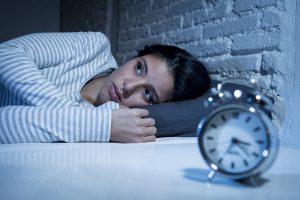Results of insomnia studies are focusing on all angles of insomnia. We know for some time that the circadian rhythm is linked to deep REM sleep, which we only reach about 2 hours into our nightly sleep. There are several reasons why our normal sleep pattern can get disrupted.
1. Night owls have a CRY1 mutation
A recent publication on March 27, 2017 has detected a mutation of the human circadian clock called CRY1. This is a dominant gene that is responsible for delayed sleep phase disorder (DSPD). People with this genetic feature tend to go to sleep 2 hours later than the average person every day.
It occurs between 0.2% and 10% in the general population and is inherited by the autosomal dominant mode.
This gene is responsible for the phenomenon of persons being “night owls”.
2. Sleep deprivation in nursing homes
Another publication has zeroed in to what happens in the frail elderly who live in nursing homes.
Here is what sleep researchers have found out about nursing homes.
- Older people also need 7 to 8 hours of sleep per night, not less as previously thought.
- Let people sleep at night, and give them undisturbed sleep. The practice of waking them up every 2 hours is unnecessary and undermines a restful sleep with normal amounts of REM sleep.
- The color of light matters: Blue/purple light coming from TVs, iPod’s, laptops or cell phones stimulates serotonin production that wakes you up. In contrast to this orange/red light stimulates melatonin production that facilitates sleep. A nursing home owner, Guildermann said: “We have made it darker at night, and what light they do have is orange/amber/red light, and we are having phenomenal results.”
- Sleep, exercise and nutrition are the biggest components of health.
3. Night workers
One of the news stories in 2016 was about health risks of night shifts. The Bureau of Labor Statistics reported in 2000 that 15 million workers (16.8 % of the working population) were doing alternative shifts (night shift work mixed with daytime shifts). In 2016 they reported 14.8% were working alternate shifts. Among blacks, Asians and Latino Americans the percentage of working alternative shifts was higher, namely 20.8%, 15.7% and 16%, respectively.
Effect of shift work on your diurnal hormone rhythm
Shift work is more common in certain industries, such as protective services like the police force, food services, health services and transportation.
Your body rewards you, when you sleep 7 to 8 hours during the night, but it will penalize you severely, if you turn it upside down. The reason is the diurnal hormone rhythm that we all have built in. Sleep is regulated by melatonin during the night, which is released by the pineal gland (on the base of the skull). Daytime wakefulness is regulated by the stress hormone cortisol from the adrenal glands. These two hormones inhibit each other, cortisol inhibits melatonin and melatonin inhibits cortisol. All the other hormones are also regulated according to the diurnal rhythm: testosterone, for instance is highest in the morning, human growth hormone is highest between midnight and 3 AM.
Studies about the effects of shift work
There are examples of what happens when you do shift work for several years:
- A) A Swedish study found that white-collar shift workers had a 260% higher mortality compared to a control group of daytime white collar workers: Shift work and mortality.
- B) A study compared night workers in the age group of 45 to 54 with daytime workers and found a 147% higher mortality rate in the night shift workers: Shift Workers’ Mortality Scrutinized. Shift workers work at night and sleep during the day. This can be done, but it is against the physiology of your body, as I explained above. Remember that melatonin does not only regulate your sleep, it also is one of the main stimulant hormones of the immune system. If you manipulate your diurnal hormone rhythm by staying awake during the night and sleeping during the day, you pay the price by an increased risk of mortality (increased risk of death). I think this is not worth it!
4. What to do when you cannot sleep?
The first step is to take 3mg to 5mg of melatonin at bedtime. It should be taken between 10PM and 11PM. It takes 20 to 30 minutes for melatonin to take effect. If you do not fall asleep within that time frame you are likely thinking too much! Relaxation before going to sleep should be part of your evening ritual. It can happen that we experience demanding, stressful days, and despite all better effort, it is difficult to be entirely relaxed. After demanding days like that I would recommend taking 1 or 2 capsules of valerian (500 mg strength) from the health food store. This combined with the melatonin should help in more than 80%-90% of insomnia cases.
Medical tests and sleep studies
If you cannot sleep, see your physician. Sleep studies may be required or you may have problems of the thyroid (hypo- or hyperthyroidism), which may need to be checked. Other medical problems including depression have to be checked out as well. Melatonin and valerian are safe. Other sleeping pills have multiple side effects including memory problems the next day or the feeling of a mild hangover.
5. Telomeres and insomnia
Some people have no problem disciplining themselves to go to sleep between 10PM and 11 PM, which seems to be the window of opportunity to catch a good night’s sleep. Others are so used to do their late night activities (reading, watching TV, being online, going to the pub etc.) that they finally drop into bed at 1 or 2 AM. People need 7 to 8 hours of good sleep; even hard-core party goers need to get that much sleep. Nature does not make exceptions! When you go to bed only at 1AM or 2AM, it is difficult to get enough sleep.
Healthy telomeres with healthy sleep pattern
It is true that you can suffer multiple health problems, as all of your hormones depend on the resetting during your deepest sleep between 2AM and 4AM triggered by the nighttime melatonin response. Even your telomeres, the caps of chromosomes in every cell get shortened from too much stress and too little sleep. Shortened telomeres mean a shortened life span. The reason for this is that people with shortened telomeres develop heart attacks, strokes and cancer. This is what shortens the life span. How do we avoid this risk? Go back to healthy sleep habits. As mentioned above it is best to start going to sleep between 10 PM and 11 PM and sleep for 7 to 8 hours.
6. Electronics in the bedroom
There is new research showing that electronics in the bedroom can interfere with a normal sleep pattern. Dr. Ben Carter is the lead author and a senior lecturer in biostatistics at King’s College London. He completed a study involving 125,198 children with an average age of 14½ years. There were about equal amounts of males and females. Both sexes had the same problem. Allowing the use of electronic media interfered with their sleep time. What electronic devices are we talking about? Watching TV, using the computer, the cell phone, tablets and computer games. The study was originally published at JAMA Pediatrics.
The blue/purple light of the TV screen or a computer screen stimulates the brain to produce serotonin. This undermines the melatonin production and as a result the person finds it extremely difficult to fall asleep.
What contributes to better sleep habits
Here is a list that contributes to better sleep habits and better sleep quality:
Sleep friendly environment in the bedroom
Ensure that the bedroom is dark, soundproof, and comfortable with the room temperature being not too warm. It is important to develop a “sleep hygiene”. This means going to sleep around the same time each night, to have some down time of 1 hour or so before going to bed and getting up after the average time of sleep (for most people between 7 to 9 hours). Sleeping in is not a solution, and an alarm clock will also help to develop a sleep routine.
Avoid stimulating drinks, drugs and nicotine
You need to avoid caffeine drinks, alcohol, nicotine and recreational drugs. Smokers should butt out no later than 7PM, as nicotine is a stimulant.
Adopt a regular exercise program
Getting into a regular exercise program, either at home or at a gym is beneficial.
No heavy meal at night
Avoid a heavy meal late at night. A light snack including some warm milk would be OK.
No computer in the bedroom
It is not a sensible idea to use the bedroom as an office, reading place or media center. It stimulates by cortisol production, which keeps us awake. The bedroom is a place of rest and should be comfortable and relaxing.
What to do when waking up at night
Some sleepers wake up at night, and they are wide-awake! Leaving the bedroom and relaxing in the living room for a while can help. It goes without saying that playing video games will not help! An alternative is to take 3 mg of melatonin, which will helps to fall asleep faster, but melatonin will wear off after about 4 hours.
Self-hypnosis recording
A self-hypnosis recording is a useful adjunct to a sleep routine. Listening to it before going to sleep helps to focus on relaxation and to stop ruminating about the day and its events. Keep the volume low.
Results Of Insomnia Studies
Conclusion
Recent results of insomnia studies have reconfirmed that we need our regular sleep to maintain our health. We have seen that some nursing homes have a practice of waking the client up every 2 hours. Nursing homes must abandoned this as it interferes with the restorative deep REM sleep. In turn this will interfere with hormone restoration overnight.
Children and adolescents must limit their time in front of the TV, iPhones and computer screens. The blue light has the frequency that over stimulates the brain and interferes with melatonin production. Some people work overnight as shift workers or party until the wee hours in the morning. This causes your telomeres in your body cells to shorten. As people restore their sleeping pattern to normal, the telomeres length will remain stable.
Important to restore normal sleep pattern
Even people who are night owls due to an inborn CRY1 gene that is responsible for delayed sleep phase disorder can normalize their sleep pattern by following a strict sleep hygiene. As people get older they lose the ability to make melatonin, but they can counter this by taking melatonin tablets at bedtime.
Remember what I said earlier: Sleep, regular exercise and good nutrition are the biggest components of health.







